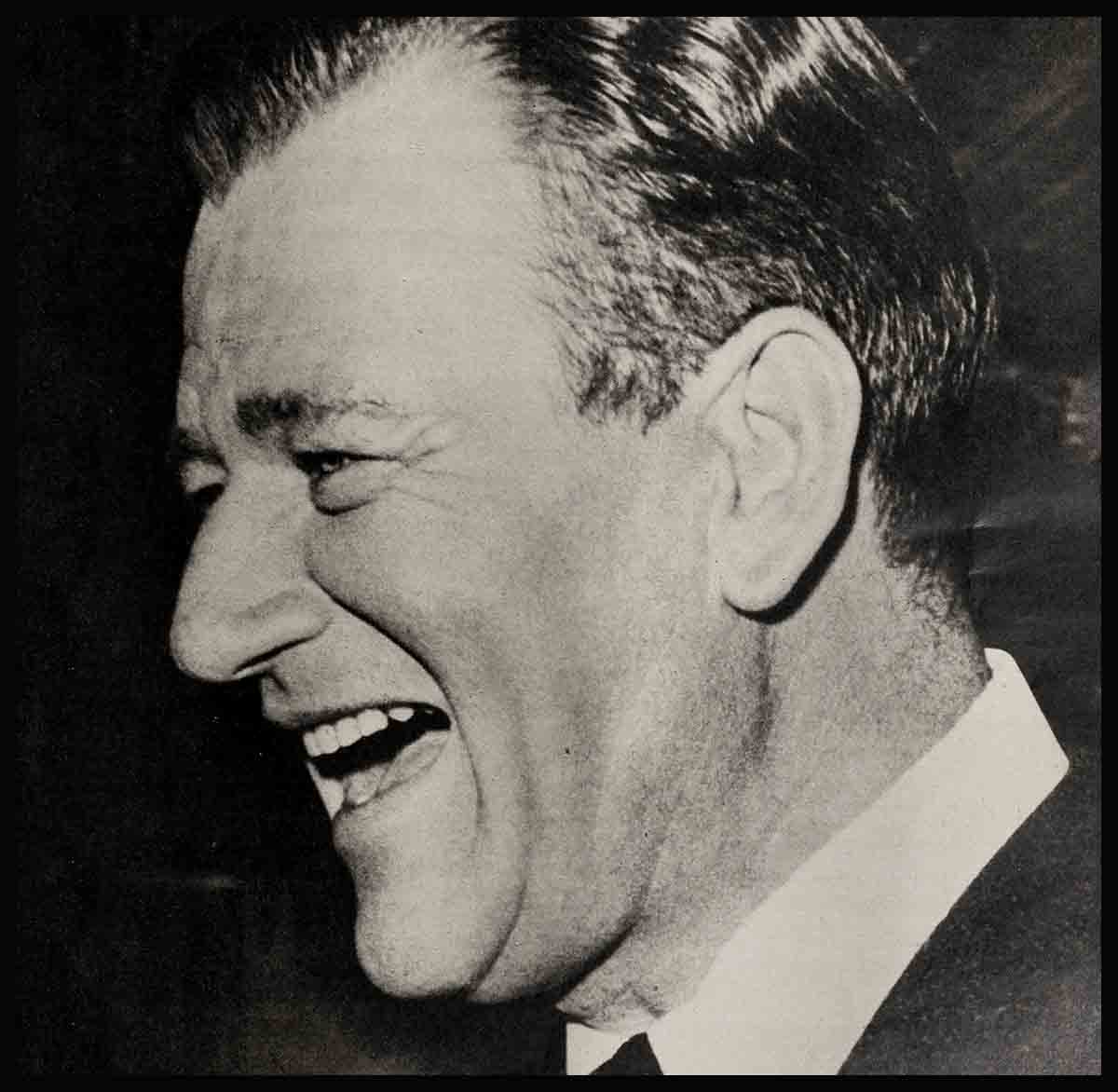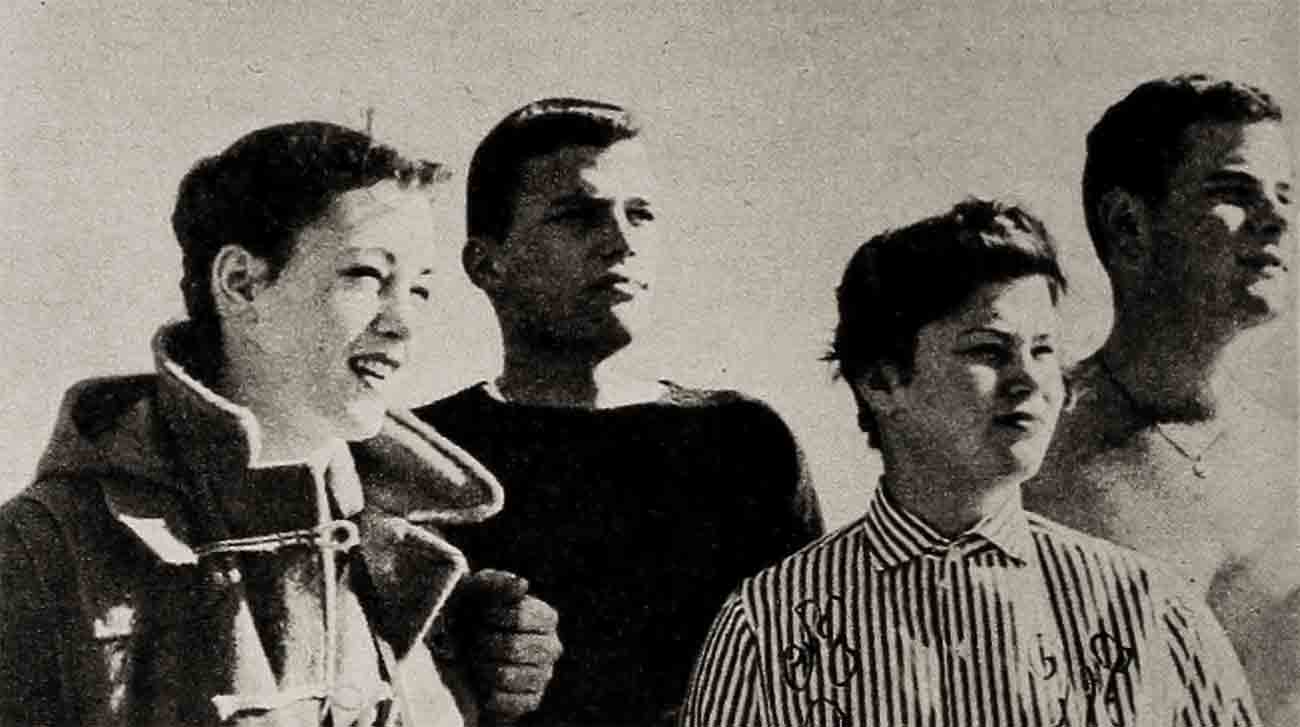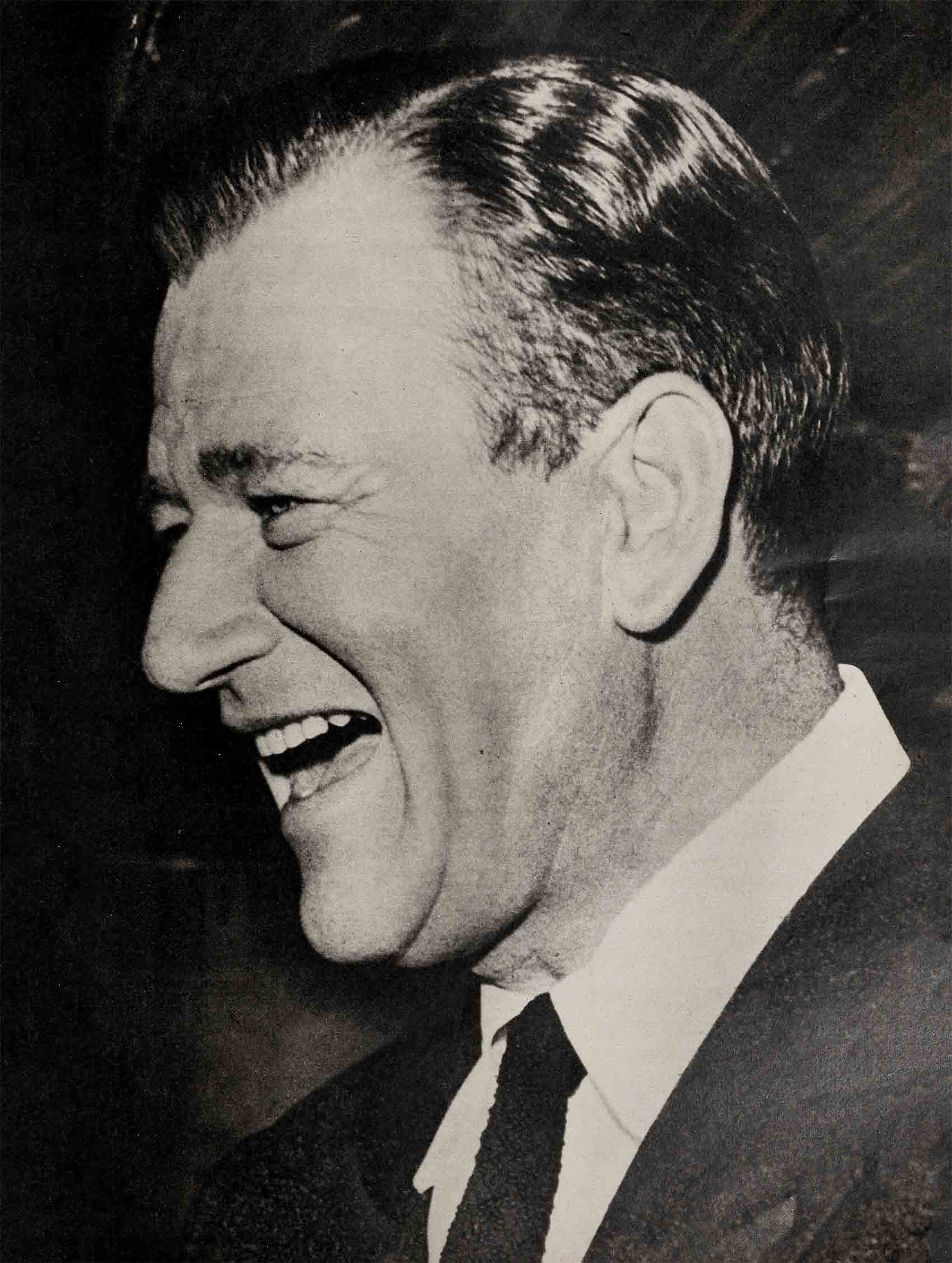
John Wayne’s Children Tell All
It was one of the last nights the Wayne kids would ever spend as “a family, all together,” and they were making the most of it. Giggling, eating, reminiscing—the works. After all, things were changing. Toni was getting ready to get married (did, too, a few weeks later), Pat was disappearing on location trips all the time now that he was in the movies, Melinda, having turned fifteen, was concentrating on boys, Michael at twenty-one was a full-fledged business man, about ready to put his giggling days behind him forever. So when they found themselves all home on the same evening, for once in a blue moon, they flopped down all over the living room, and gabbed. It was Toni who got onto the subject of their father, merely by pulling a new lipstick out of her bag and showing it to Melinda.
“Remember,” Toni said thoughtfully, “Dad’s face the first time he saw me in lipstick?”
“Oh, boy,” Michael chortled. “Was that something! How old were you—about ten?”
“I was not,” Toni said indignantly, “I was at least fourteen. And all the girls at school were wearing lipstick, so naturally, I did, too. And then Dad came over to the house one day, and when I walked in he hit the ceiling. ‘You’ve got make-up on,’ he bellowed. ‘Oh, come on,’ I said. ‘I’m almost fifteen, Dad.’ You’d have thought I had it smeared an inch thick from the fuss he made!”
“I don’t see why you had so much trouble,” Melinda put in. “I never did.”
“Naturally,” Toni said. “I broke the ice for you. You had a cinch. Why, when you got your first formal—”
“Dad went shopping with me,” Melinda interrupted. “I didn’t know he knew anything about women’s clothes, but he has pretty good taste.”
“You see?” Toni said. “Whereas when I got my first evening dress he really flipped. He stood there looking at me for ages and then all he could get out was, “You’re grown up!’ Though I must say he recovered O.K. That was the time he took me to my junior prom in high school, and it was a very nice evening—even though he dances some vintage I never heard of.”
“That,” said Pat, “is because basically Dad is a man’s man. Now he never had any trouble with me!”
“Ha!” said Melinda. “Seems to me I heard about how you had to be taught to swim by being pushed off a pier when you were five. No wonder you grew up athletic!”
“And I’m not exactly the indoor type myself,” Toni said. “A lot of choice I had, being sandwiched in between you two boys, and all those swings and trapezes and things in the back yard. And Dad always announcing, ‘I want you children in Good Physical Condition!’ ”
“He used to roughhouse with me, too,” Melinda added. “He always seemed so big. But I notice he’s shorter now!”
The other kids howled. Melinda has just reached what they devoutly hope will be her full height—five-foot-seven!
“Yeah,” Pat said, “but it was Mike and me Dad always took fishing, and spear fishing, and hunting—and I never noticed him teaching you girls to block, either.”
“Well, it never did much good with me,” Michael mourned. “It’s my jinx. I had to go and get hay fever.”
“It’s not hay fever,” Toni corrected. “It’s an allergy that gives you hay fever.”
“Never mind what it is. All I know is every time I got out on a grassy football field, in two minutes I couldn’t see a thing.”
“Poor Michael,” said Melida, giggling. “Maybe you ought to give up and be an actor like Pat.”
“Oh, NO!” roared the other three in unison. Michael drew himself up. “I,” he said, “am a business man.”
“Anyway,” Toni said, “you wouldn’t stand a chance in the competition. Pat’s the ham in the family.”
“I’m the ham!” Pat said, indignantly. “Every time you come in from a date with Don you glide around the house like Tallulah Bankhead!”
“She’s thinking about wife-hood,” Melinda said. “Dad is giving her instruction.”

The Duke gives lessons
Patrick sat up. “What’s he telling you? I hope it’s about housekeeping. I don’t know where you disappear at chore time, but I never saw anyone make such a fuss about taking care of her room.”
Toni laughed. “If you must know, I hide in the closet. And as I’ve explained to you, I’m too near-sighted to see the dust. But with Dad—it’s not so much telling as—er—object lessons. Over New Years, for instance, when Mike and his girl and Dan and Don and I went to Catalina on the boat. I yelled to Don to come get his things out of the cabin so Gretchen and I could unpack. And Dad positively howled down the hatch, ‘Don’t you boss him or anybody else around like that!’ ”
“Dad’s a fine one to talk,” Michael commented. “For a man who’s losing his hair, he sure still has his temper.”
“Oh, not the way he used to,” Toni said. “I remember once when the laundry starched his shirt collars, and I can still see those shirts flying down the stairs! He wouldn’t do that now. I don’t think!”
“Besides,” commented Melinda, “if he still had a temper, you’d never get away with teasing him about it. Or ribbing him about his hair.”
“You, Miss,” said Pat, “are the one who insists on checking every time he comes over to see how much more has disappeared.”
Melinda wasn’t listening. ‘Remember how sore he got when I flunked math? But after he gives you the heavy treatment, he always makes you laugh.”
“Not always,” Michael said. “I remember once when he didn’t. Know what I mean, Toni?”
Toni nodded. The time we deaded the duck.”
That was the time Duke Wayne came home from work and got the news about the ducks. Michael and Toni were four and two respectively, and on Easter their father had given them each a pet duck. That fateful day an older boy in the neighborhood had suggested a funeral. Happily cooperating, the two Wayne youngsters had stuffed dirt down the throat of one duck and were working on the other when a maid tore into the garden and stopped the slaughter. Duke was furious when he heard about it.
“Come here!” he bellowed to the two toddlers. “What did you do today that was naughty?”
“We deaded a duck,” offered Michael.
Wayne proceeded to put a large hand over each small face, shutting off their supply of air. “How do you like it?” he demanded.
When she had stopped crying, Toni offered the only argument she could think of. “But Daddy, we only killed one of them.”
Feminine logic
“Dad called that,” remembered Toni, “a shining example of what they call feminine logic.” Regardless of how many ducks were “deaded” that day, the kids never forgot it. “Cripes, was he mad!” Michael said, thoughtfully. He thought about it for a while. “We still can’t fool him about anything,” he added. “He’s—er—on the ball. He keeps up with the world too well.”
“Oh, I don’t know,” Toni said. “Look how I got my car.”
“I wish you’d tell me how,” Melinda commented. “I’ve been asking for one for absolutely years. I don’t know why I should be the only one in the family without wheels!”
Toni settled back against a cushion. “I will tell you how it is done,” she said. “Dad asked me what I wanted for graduation and naturally I said a car. But he said I was too young and his answer was a positive no. I had all his friends working on him, but he still held out. So I said all right, if he wouldn’t get it for me, I’d earn the money and buy it myself. That got him. It wasn’t long before I heard via the grapevine not to make any plans, that Dad was going to give me a car.”
“Well,” Melinda said mournfully, “he must have caught on after he thought about it. I suppose I’ll just have to wait. Anyway, I’m living proof that he doesn’t spoil us, in case anyone wants to know.”

Dad never pushed
“I’ll say,” Pat put in. “Why, the whole time I worked in that picture we made at Big Bear, I’d notice Dad watching me—but he never said beans, never gave me any advice, or tried to push me ahead.” He paused. “It’s funny—the way he always knows the way you want things.”
“Still,” Michael said, “you must admit you got your start easier than most, having Dad for a father.”
“I know. I don’t kid myself about that. But it has its disadvantages, too. Standing in his shadow is no cinch—you must feel that over at Batjac, too. Sometimes I’m not sure I want to go on with it.”
“Now, Pat,” said Melinda, “dear Pat, clever Pat—you wouldn’t let such a great talent go to waste—would you, precious Pat?”
“What is this bit?” Pat demanded. “Every time I open my mouth, I get smeared with flattery. What’s the object?”
The others giggled. “We’re on a be-nice-to-Pat kick,” Toni laughed. “A careful check of available finances has shown that you are the only one who has any.”
“I don’t see why,” Melinda complained. “You’re not the only one who has worked. I worked at Batjac during Christmas, and Toni has worked at department stores—and Michael had a paper route when he was a kid, just the way you did.”
“The answer is obvious,” Pat remarked. “I save. You spend. Why don’t some of these boy friends I never hear anything about pay your way into the movies?”
“They do,” his sister retorted.
Pat smiled hopefully. “Tell me about them.”
“Oh, no,” Melinda said. “The only ones I tell are Toni and mother, and that’s the way it’s going to stay. If I told you and Michael I’d be a dead duck. A girl has to keep some things to herself, around this house, if she wants some peace.”
“Why, baby,” Michael said. “We wouldn’t tease you. We’d give you advice and protection. We always have.”
“Oh, sure,” Melinda said. “Like you did that time at dancing school.”
“What time?” Toni asked innocently.
“The time the kids who were supposed to be in the recital didn’t show up and they made us dance for the audience. We nearly died of embarrassment, remember?”
“I begin to.”
“And first you and Michael danced together, and then Pat and I had to follow you. And my dear brother had my dress caught up in back and neither of us knew it. And did you and Michael give us the high sign? No sir, not you two. You just sat out there in the audience and went into hysterics. If Dad had been there, he’d have waved or something.”
“He’s a gentleman”
“Dad would have laughed, too,” Michael defended himself. “He’s got a great sense of humor.”
“He’s a gentleman,” Melinda said. “You can rely on him.”
“True,” Michael said soberly. “He’s always there when you want him. That time I went camping and fell down a mountain and punctured my lung. He flew up right away. It was so great to see him there—”
Pat was thinking of something else. “Remember when we were always paired off the way we were at dancing school? Melinda and I, and Michael and Toni. Whereas now Michael and I hang out together and you two girls are thicker than thieves. Melinda’s always in Toni’s room, and—”
“Yeah,” Melinda interrupted, grinning. “Picking up after her.”
“—and now,” Pat went on, “it’s all ending, in a way. All of us going in separate ways. Toni getting married, and Michael becoming an executive—”
“And you becoming a millionaire,” Michael put in.
“—and Melinda practically in college at Sacred Heart already—we’re really not kids any more. It’s funny.”
“Better not let Dad hear you saying that,” Toni advised. “He hates to admit that we’re growing up so fast.”
“It’s all right,” Michael said. “He’s got Aissa to baby now.”
They smiled at each other. “Lucky kid,” Melinda said. “I wouldn’t trade Dad in for any father in the world.”
Pat looked around the room, stretched out his arms, and yawned. “Yeah,” he agreed, happily. “I guess we all turned out not so bad at that. Goodnight, you Waynes. I’m going to bed.”
THE END
John Wayne will soon appear in MGM’s The Wings Of Eagles.
It is a quote. MODERN SCREEN MAGAZINE SEPTEMBER 1956




